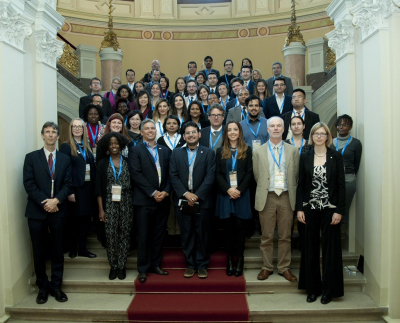


Over 900 science leaders from over 100 countries have gathered at the World Science Forum 2015 in Budapest under the theme “The Enabling Power of Science”. On Wednesday, over 50 early career researchers from 30 different countries convened by IAP, WAYS, ICORSA, GYA and UNESCO gathered to analyse challenges and opportunities facing young scientists globally, identify strategies that link global challenges to career opportunities, and present policy recommendations to empower young scientists to impact the 2030 Sustainable Development Goals (SDGs).
The session highlighted the importance of science and technology as tools for economic growth, social inclusion and regional integration in the post-2015 sustainable development agenda. The four organizations representing young scientists around the world came together for the first time to present a unified voice for the emerging international young scientists movement, which is demanding a seat at the table in policy discussions and decision making that require scientific input.
All four organising entities connect and articulate emerging scientific initiatives driven by early-career scientists throughout the world for collective impact. The inclusion of young scientists is essential from at least two perspectives: first, the young researchers of today are the science leaders of tomorrow and shape the future of science. Second, young scientists are role models for students choosing scientific careers. These roles link science today and the science of the future, and should be reflected more in science and technology policies throughout the world.
The results of these exercises were presented in a 'competitive' plenary session (Lion’s Den) where young scientists pitched their ideas to a distinguished panel of experts, including the IAP Co-Chair, Mohamed Hassan, ECO Science Foundation President, Manzoor Soomro, Executive Officer of the Academy of Science of South Africa, Roseanne Diab, Director of Division of Science Policy and Capacity-Building Sector for Natural Sciences at UNESCO, Maciej Nalecz, and Senior Science Policy Specialist at UNESCO Latin America and the Caribbean, Ernesto Fernandez Polcuch.
Young scientists presented five ideas on health, clean water, education, jobs, and responsible consumption. Ideas were judged on originality, practicality and persuasiveness. The winning group (Team Jobs of the Future) focused on SDG8, Decent Work and Economic Growth, pitching a gap analysis for the skills that would be required for the jobs of the future. Their idea included developing suitable training courses to provide a talent pipeline to supply future workforce needs.
IAP Co-Chair, Mohamed Hassan, said of choosing the winning team, “It was a dynamic session with original ideas from future science leaders. It was a difficult decision to choose a winner. In the end we went with the team that had visionary ideas for transforming SDGs into reality.”
Recent updates: Young Scientists are submitted reports and feedback - following the links below.
Esther Akinlabi, nominated by the Academy of Science South Africa (ASSAf), reports back on her experience at the World Science Forum HERE
Jonathan Dawes, nominated by The Royal Society contributes to the 'In Verba' blog HERE
Damon Mathews, nominated by The Royal Society of Canada (RSC) reflects on his participation in the World Science Forum HERE
WSF is a  unique platform that brings young scientists in contact with high-level policymakers to help shape both the science and the world of the future.
unique platform that brings young scientists in contact with high-level policymakers to help shape both the science and the world of the future.